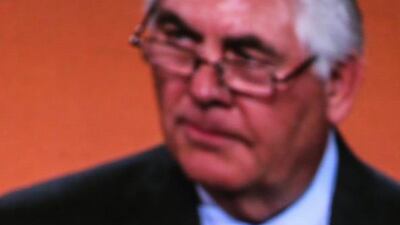The conversation about Rex Tillerson has been dominated by his lack of public service experience, but one of the few things certain about president-elect Donald Trump’s nominee for US secretary of state is that his tenure as chief of Exxon Mobil has been marked by discreet diplomacy.
The clearest indication of that discretion is that so little is known about the head of the world’s largest publicly listed energy company, apart from a reputation for old school corporate rectitude.
"He comes across as sophisticated, yet his life is rooted in environments that are fundamentally nostalgic for imagined midcentury virtues," wrote Steve Coll, the New Yorker journalist who wrote Private Empire: ExxonMobil and American Power, a 2012 bestseller that chronicled the American oil company's power-broking across the globe.
Much has been made of Mr Tillerson’s close relationship with Russia but one of the few anecdotes about the Texas son of a Boy Scouts of America administrator involved him enraging the Russian president, Vladimir Putin, over his strict adherence to legal procedure while pushing forward a lucrative deal to develop resources on Russia’s Far East Sakhalin Island.
Mr Tillerson, an ExxonMobil lifer who rose to chief executive in 2006, also has had many top-level dealings in this region.
“Exxon has been pretty successful and to be pretty successful you have to be able to operate in the Middle East and to be able to operate in the Middle East means the head of Exxon needs to get on well with a wide cast of characters in the region,” said Professor Paul Stevens, an energy economist and fellow at Chatham House, a think tank in London.
This has included Abu Dhabi where under his tenure ExxonMobil decided to opt out of competition to renew its concession to participate in the emirate’s onshore oilfields and instead concentrate on a more independent role in developing the giant offshore Upper Zakum field, which is on track to produce 750,000 barrels per day by 2018, with Exxon’s 28 per cent share accounting for about 5 per cent of the company’s worldwide oil production.
Last month, in a speech at Abu Dhabi’s annual oil gathering, Mr Tillerson outlined plans to boost that further, to 1 million bpd over the next few years, which would mean ExxonMobil would oversee production of nearly 30 per cent of Abu Dhabi’s output.
The ExxonMobil chief is understood to have a close working relationship with Abu Dhabi’s leadership, including Abu Dhabi National Oil Company’s head, Sultan Al Jaber, who included Mr Tillerson in last month’s unique closed-door summit of the world’s oil chiefs in the UAE capital.
“Even in that company, it was clear he was the commanding voice,” said a person, who was at the round table talks. “He’s one of the most technologically astute, strategic thinking leaders in any industry – pragmatic, non-ideological, a dealmaker.”
Exxon’s independent course here, though, gives just a hint of a ruthless pursuit of the company’s interest that has on occasion run counter to US foreign policy, a tendency that has raised concerns among some US politicians.
Notably, ExxonMobil under Mr Tillerson decided to pursue independent deals with the Kurdistan Regional Government in 2012, despite the US government’s position that the central Baghdad government had sovereignty over such contracts. Though pulling back some, ExxonMobil retains 80 per cent operating stakes in the Al Qosh, Pirmam and Bashiqa blocks.
Mr Tillerson has also sought to push ExxonMobil more into the mainstream in terms of climate change policy, even if that hasn’t won over many of the company’s critics among environmental groups.
In stark contrast to his predecessor, Lee Raymond, who was a caustic critic of international climate change policy efforts, Mr Tillerson reaffirmed ExxonMobil’s position in his speech here last month:
“At ExxonMobil, we share the view that the risks of climate change are serious and warrant thoughtful action,” he told the Abu Dhabi oil industry audience. “The best hope for the future is to enable and encourage long-term investments in both proven and new technologies while supporting effective policies.”
Ironically, that would put him at odds with a number of climate policy sceptics in Mr Trump’s cabinet.
amcauley@thenational.ae
Follow The National's Business section on Twitter

